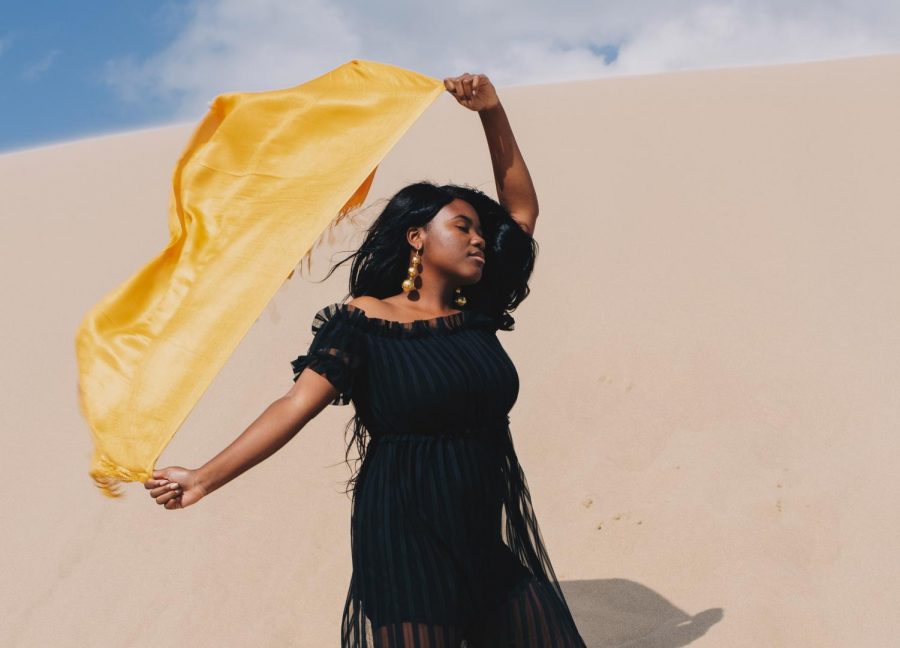Afrofuturism and its resurgence
December 3, 2018
“Envision a world in which Blackness floats free of the constraints and violence that so often weigh it down today. And this freedom, enabled by technology and the fundamental belief that black life matters, is one definition for what has become a big, encompassing, and increasingly important term: Afrofuturism”
-Elizabeth Reich
Afrofuturism is a movement that draws from science fiction and activism to combat the historical marginalization of black individuals and manifest a more positive future where black people are seen for who they are as people, disattached from the negative image portrayed by the media.
“African Americans constitute nearly 1 million of the 2.3 million person prison population…, and more than 26% of African Americans live below the poverty line.” Elizabeth Reich wrote this in her essay “Why Afrofuturism Matters” and as she continues, she describes a world where, “Afrofuturist art and politics become a conduit to another galaxy in which Blackness survives — and a way of articulating the urgency of real black freedom.”
The Afrofuturistic concept includes historical roots, that when combined with futuristic technology, create an innovative freedom and enforces the fundamental belief that black life matters.
Afrofuturist Delta Major, states that the concept creates a pathway for “black liberation and allows for the transformation of ourselves and others in our communities.” She manifests this by creating “wearable art” that defines beauty and sexuality on her own terms instead of societies.
Ytasha L. Womack, author of the book, “Afrofuturism: The World of Black Sci-Fi and Fantasy Culture” writes, “Afrofuturism is an intersection of imagination, technology, the future, and liberation… Afrofuturism combines elements of science fiction, historical fiction, speculative fiction, fantasy, Afrocentricity, and magic realism with non-Western beliefs. In some cases, it’s a total re-envisioning of the past and speculation about the future rife with cultural critiques.”
Afrofuturist and Oregon State masters student of Applied Anthropology, Micknai Arefaine, says Afrofuturism brings her joy and helps her cope with today’s difficult reality. Afrofuturism is one way to escape from the hate that is infiltrating into our politics and being spread across the country.
Arefaine describes that Afrofuturism can be found in unexpected avenues of art, music, film, literature, and graphics. The reclamation of the past narrative and the reimagination of future; appears in movies such as, Black Panther, and music albums like ArchAndroid by Janelle Monae.
Alternatively to mainstream media, Arefaine talks about Sun Ra, a musician that pioneered Afrofuturism and who’s performances are “one big Afrofuturist ritual.” Since Afrofuturism is also an aesthetic culture, it has a strong influence in fashion.
Afrofuturist singer and fashion icon, Erykah Badu, inspired Arefaine as “she has worn fierce Afrofuturistic looks over the years. Erykah Badu pushes the boundaries with the clothes that she wears during performances and transcends beyond the norm.”
When asked what the future will look like, Arefaine refers to Adrienne Maree Brown’s depiction, a brilliant writer, activist, sci-fi nerd, and editor. Brown wrote in a piece titled “All Organizing is Science Fiction” that with imaginative activism “we are bending the future, together, into something we have never experienced. a world where everyone experiences abundance, access, pleasure, human rights, dignity, freedom, transformative justice, peace. we long for this, we believe it is possible.”
Afrofuturists, like Melanie Goodreaux use this alternate reality to expand people’s minds to combat the anti-blackness mentality that is upheld in our society. Goodreaux’s, Afrofuturistic play, “Enough Vo5 for the Universe,” depicts a futuristic world where societies normalize non-binary genders and embrace people of color. This play celebrates black queer lives and what it’s like to be accepted as who you are. This contrasts against the current societal climate where queer people of color are disproportionately affected by violence. Works such as these urge society to envision and construct a future with a more intersectional mindset.
As Afrofuturism provides an outlet and shows our society a world of freedom from pain, a world of justice and peace is possible. Arefaine said, “Afrofuturism has many lessons but ultimately, we can learn that there are many ways of knowing and being in the world. We can use storytelling for liberation and imagine ways to bridge our worlds. As black folks, we can learn so much about ourselves through Afrofuturism. We can learn how to be agents in the change we want to see.”


